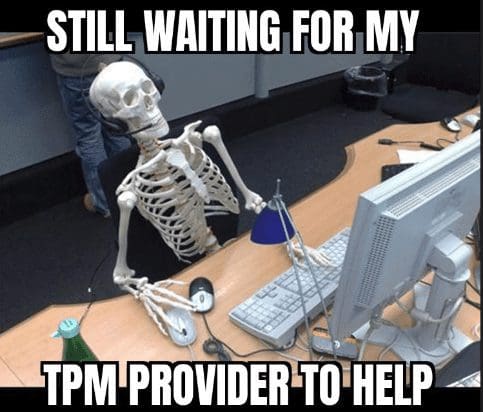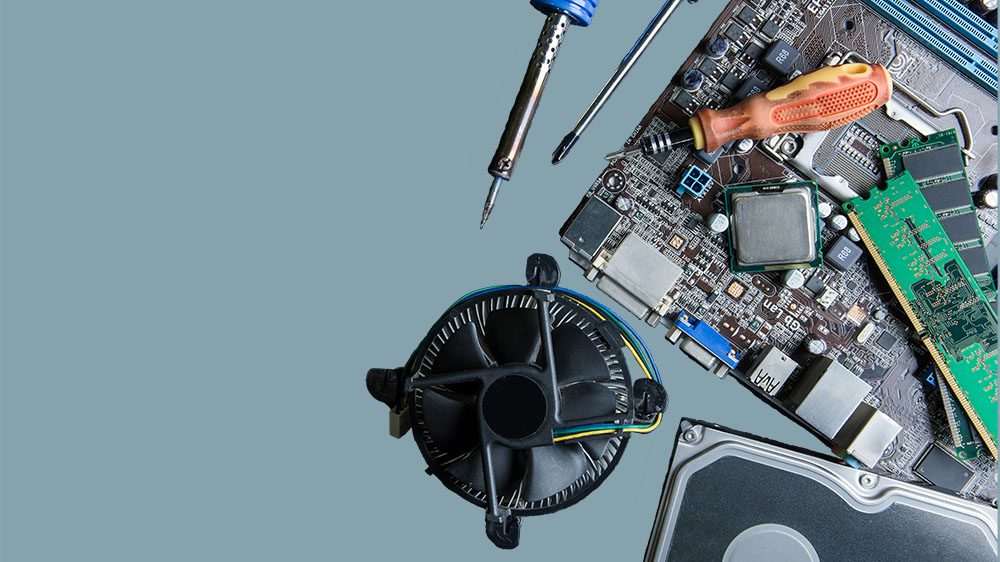Toxic Behaviors in Hardware Support
Don't Put Up With Bad Service
Gaslight, gatekeep, narcissistic — most of us are pretty familiar with these problematic behaviors thanks to open discussions surrounding mental health, therapy, and personal growth. But did you know your service providers can also exhibit toxic behaviors? We've been hearing stories lately from people who have had some experiences that go beyond mediocre service. Honestly, it surprises us that people put up with that kind of treatment, thinking it's normal and "not that bad."
The good news is that you can educate yourself on the warning signs and make the choice to expect more from your hardware support relationships. We've got some tips and questions you can ask your provider to help you deal with the problem, or just switch to a provider (like M Global) who makes a conscious effort to not engage in these types of behaviors. Whether you have support through the OEM or other providers, these situations will probably feel a little familiar.
#1 Price Hikes
This is probably the most common experience we've been hearing recently - renewal contract costs increasing dramatically, sometimes doubling or more. While we can't speak to the motivation of other companies raising their prices, we'd be surprised if it had anything to do with actual costs. It might be related to increasing profit margins or weeding out clients that aren't big enough fish to be worth their time.
One recent situation made us chuckle — someone came to get a quote for hardware support because their current provider (a big player who shall remain nameless) jacked up their prices by over 70%! They took our much better quote back to the provider, who brought their prices down accordingly, proving the price hike was unnecessary.
What You Can Do
We're not here to judge — if you want to continue a relationship with a provider who treats you like you don't matter and will raise your price (even when they obviously don't need to), that's your business. But we can tell you that a rise in hardware support prices is not industry-wide. Blaming a price increase on the blanket excuse of inflation — also bogus.
You can get aftermarket support for the same price you were paying or less. And, if you are determined to stay with your current vendor, at least get some quotes from other providers to use as a bargaining tool.
Do: Shop around and get multiple quotes.
A Word From Steve on Price Hikes
#2 Always Waiting: Slow Response Times

Whether it's super slow response times during a service ticket (an auto-generated response does not count, people!) or a snail's pace reply to a quote request, it's so frustrating to twiddle your thumbs and wait for your provider to get back to you.
One of the most common (and sneaky) ways of controlling a situation is to make someone wait for you. While it can appear unintentional (and sometimes it is), chronic lateness and delays can also be a symptom of more problematic behavior patterns such as passive aggressiveness or gaslighting.
The power dynamics in any relationship can be heavily impacted by waiting. Even if it is unintentional, making someone wait can subconsciously communicate to the person waiting for you, "My time is more valuable than yours." Therefore, " I am more important than you." It becomes even more complicated in a customer/service provider relationship.
Waiting can (and often does) breed frustration but it also cultivates a sense of powerlessness and inevitability in the person waiting. It's a delicate balance, but often, it makes a person more likely to give in to unfair treatment, price hikes, or give up entirely. We've all been there after an hour on hold, right? Some studies have even shown that in retail settings, people purchase more when they have to wait in long lines to subconsciously "make it worth the wait."
What You Can Do
Let's be clear — that is not normal!! You don't have to put up with that (at least when it comes to hardware support).
Pay attention to response times starting from the first interaction — did it take a while to get a response (from a real person)? If so, you can probably expect something similar with the rest of your service. Here are a few questions to ask yourself:
- Does it typically take longer than 48 hours for a response to your communication?
- Have you noticed less attention, leaving you to suspect that you aren't a big enough fish to warrant fast service?
- Are response times in service tickets slow, or mostly comprised of auto-generated replies or vague responses such as, "We'll get back to you"?
If the answer is yes, you're probably waiting longer than is necessary. You can try addressing the issue directly with your rep to see if you notice any improvements. Also, we recommend getting as much information as possible before you sign on the dotted line. Response times for service tickets will depend on how your SLA is set up — not just which one you choose but also how they define elements of the SLA (such as parts stocking or the "4" in a 7 x 24 x 4, for instance). For more on how M Global approaches response times, check out Response Times Matter.
#3 Half Truths, A Lazy "Yes", and Sales B.S.
Unfortunately, getting a hardware support quote can sometimes feel like you've wandered onto a used car lot. Pushy (but not particularly knowledgeable) sales staff try to close the deal — saying yes to everything a little too quickly without even checking your details and making big (but vague) promises that seem too good to be true. And you've got the uncanny feeling that everyone is reading off the same script or training manual.
If you've ever felt that way — your instincts are probably spot on. While there probably isn't an active effort to deceive, it's also pretty likely you're not getting the whole picture.

A major reason for that could be the disconnection between the sales floor and the service operation. In larger companies, there are often several layers of staff in the operational structure, making it likely that multiple people will have to touch every project. Sales, quoting, logistics, procurement, FE scheduling, engineers, and more will all be separate teams of people.
The more layers added to a project, the more opportunities for mistakes, miscommunications, and delays. The classic feud between those providing the service and those selling the service (sales & engineers in the case of hardware support) becomes more intense the more disconnected the two sides become. The sales team might promise the moon wanting to have happy customers, and the service side is going, "Why?! We can't do that!" Add multiple layers of procurement, schedulers, project managers, and more — and you have a recipe for potential problems.
What You Can Do
Educate yourself and sniff out the B.S. by talking to multiple providers and asking questions. Even if you already have support through the OEM or a TPM provider, it doesn't hurt to get some knowledge about the support you currently have and how other companies approach things. We are big advocates for educating customers and are happy to peel back the layers and provide information. We have often found that what we share is brand new information to people. Possible questions to get the conversation started could include:
- What does the 4 (in a 7 x 24 x 4 SLA) mean?
- Does that response time guarantee mean I'll talk to a real person or get an automated response?
- Can I get a list of parts that will be stocked locally? Do you share parts inventories among customers? (We call B.S. on a salesperson who says they stock "everything" locally, especially if they don't have the config details or share parts inventories.)
Consider whether your priorities align with the provider. Is speed your biggest priority? Price? Guaranteed SLAs (not best efforts)? You may have to dig deeper and read between the lines to discover what companies actually prioritize (rather than just what they say is important). Reading a mission statement or listening to sales jargon is unlikely to reveal actual practices and attitudes. Much like the above tips, pay attention to how long they take to respond, if your prices have been raised, and if you're getting vague answers to direct questions about how situations would be handled and internal processes.
#4 Information Hoarding: You're Never In The Loop
Withholding information is the distant cousin to what you might experience from the above behavior with sales B.S. and "lazy" yeses. It might not always be intentional, but not having the information you need can leave you feeling out of the loop, anxious, and unable to plan your next step. Besides the obvious problems this behavior can cause on the front end while shopping for a support vendor, information hoarding (also called "knowledge hiding") can cause chaos on the service side of things as well.

You've probably heard the classic, "We're working on it," or a personal favorite, "I will escalate this for you," which is code for, "I don't know what's going on, but I'll make it someone else's problem."
It makes sense that many companies would seek to keep a layer of professionalism and not reveal too much of what's going on behind the scenes, especially if it shows them in an unflattering light. But when that crosses the line and becomes purposely vague, ambiguous, and unhelpful, there can be serious consequences for both sides.
Studies have shown that the "risk of hiding" can be more detrimental than its counterpart, the "risk of revealing," as it erodes trust and causes negative inferences on character and integrity. As people become suspicious, they may even make harsher judgments than if an unsavory truth was revealed. On a practical note — let's say you're in the middle of a service ticket and experiencing delays with your provider. Which scenario would be more useful for you?
- Option 1 - Vague excuses of "escalating the situation" and "we're working on it" that keep pushing the timeline out further and further.
- Option 2 - Open communication explaining the problem, such as, "Here’s the situation. Due to the holiday, we’re not able to get the part to you today. But first thing on Monday, we're going to be reaching out to our vendors to source the part that’s needed. We have a couple shipping options, whether it’s same-day shipping or priority overnight out to you. We expect delivery on Wednesday. We'll keep you in the loop with any updates to the situation."
Obviously, option 2 is more helpful as it allows you to plan and prioritize resources to cover until the situation is resolved.
What You Can Do
Unfortunately, it's pretty hard to spot information hoarding and knowledge hiding before it happens. What you can do, though, is take action when you suspect it might be happening to you. If you suspect you aren't getting the whole story, ask for more details, such as an ETA or parts inventory lists. Check out how we handle communications in Accountability at the Help Desk.
One last note — It's okay to change your mind — and your vendor. If you're not sure you're getting the best possible service, switch. It's a good idea to double check the provider's cancellation policy before signing a contract. Not everyone has a customer-friendly cancellation policy (like M Global). And it would be a shame to be stuck in a toxic hardware support relationship.
Let M Global Help
We've got your back! Reach out to us if you'd like to find out more about how we can help you! We're all about creating positive, long term relationships with our clients — no drama or toxic behaviors here!
Give us a call or fill out a form if you'd like to find out more about how we can help you!

Reach Out to Us
Suggested Content







